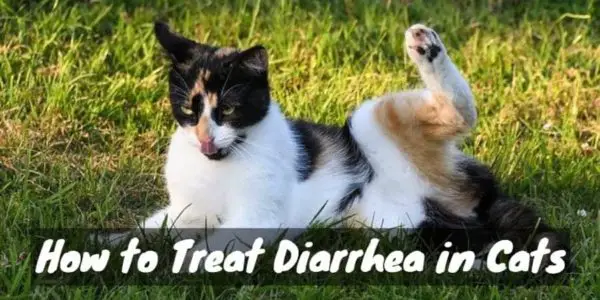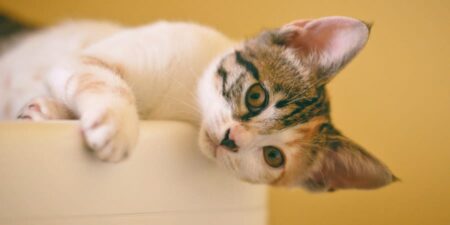Your cat has diarrhea. What can you do?
When your cat’s otherwise impeccable bathroom habits suddenly result in a runny pool of mustard-colored gelatinous funk, what does it mean? Fresh cat poop, to be direct, never smells like a bed of roses. But diarrhea could mean real distress for your cat.
Here we go over some ways on how to treat diarrhea in cats and what can cause it.
What Is Diarrhea in Cats?
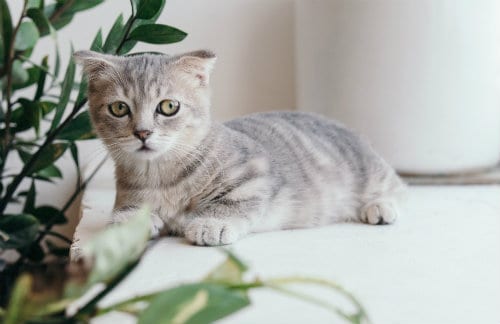
Cats, like you, are susceptible to normal bouts of stomach upset and the unpleasant results. Assuming your cat uses a litter box, this gives you a chance to examine his bowel movements daily. You can tell immediately whether something is amiss with him.
Diarrhea reflects a problem in the small or large intestine. It is caused by absorption of too much water from a disruption in the intestinal lining. This imbalance is due to inflammatory, digestive, or metabolic abnormalities.
[amazon bestseller=”cats vitamins immune”]
Acute Versus Chronic Diarrhea
An acute episode comes on suddenly, usually within one to three days. It may disappear as suddenly as you first noticed it. If not, but you can determine the cause quickly, these cats have a great chance of promptly returning to normal.
Alternatively, chronic diarrhea lingers for five days or longer. Some cats with food intolerances can struggle with loose bowels continually or on and off for months.
Both acute and chronic diarrhea can lead to complications like dehydration and blood in the stool. Although you may blow off your struggles with diarrhea as no big deal, always take your cat’s digestive issues seriously.
A feline’s small size, coupled with her inability or unwillingness to disclose when she is sick requires an urgent assessment. Once you decide the abnormal stools relate to a minor and temporary indiscretion, then you can put your worries to rest.
What Are the Causes of Diarrhea in Cats?
Determining the cause of your cat’s soft stools is often simpler than you expect. Now and then reasons are elusive and require intervention from your veterinarian to diagnose.
Food Allergies and Intolerances
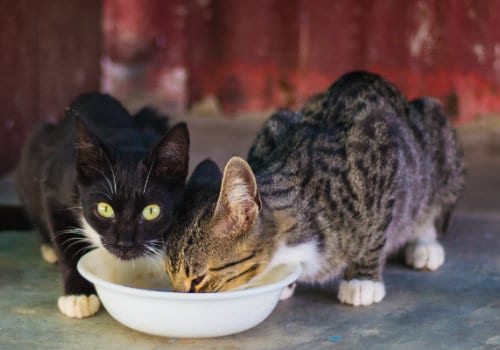
Knowing whether your cat is suffering from a food allergy or an intolerance to a specific ingredient is sometimes difficult. You may see vomiting in both. In either scenario, you should avoid feeding your cat the food in question.
Change in Diet or Dietary Indiscretion
Does your cat avidly hunt? Or does he raid the garbage? Dietary indiscretion, although not as common as in dogs, can cause diarrhea in your cat.
Most adult cats do not tolerate any dairy products, including milk and cream, despite images to the contrary. Cats, like most adult mammals, lose the ability to digest lactose shortly after they are weaned.
If you discover a brand-new delicacy you would like to feed your cat. Veterinarians always recommend you make the change gradually over several days. Sudden changes in diet can lead to digestive upset.
Parasites
Intestinal worms or other parasites are the top reasons for diarrhea in kittens. According to conservative figures, as many as 45 of every 100 cats may harbor intestinal parasites.
Coccidia
Coccidia is readily transmitted between infected cats and in some cases is spread by ingestion of infected prey.
Isospora is a one-celled parasite and exceedingly common in kittens. It causes incontinence and bloody stools. Diarrhea left untreated can be debilitating because infestations often begin at such an early age.
Toxoplasma Gondi infects older cats and may or may not cause symptoms like diarrhea. A large concern for this parasite is it can be passed to people, especially immune-compromised and pregnant individuals.
Worms
Roundworms
Roundworms are the most common parasites affecting people and pets. According to Cornell Veterinary School, up to 75 percent of cats, especially kittens, may have a roundworm infestation. Cats who hunt also have a higher parasite load.
Hookworms
Hookworms are less common than roundworms but cause more serious symptoms. Since the worms feed on blood, they can cause anemia as well as bloody or tarry diarrhea.
Tapeworms
Tapeworms are very common in cats but rarely cause diarrhea. They occur from eating prey or ingesting fleas.
A few uncommon parasites of cats that rarely cause diarrhea are whipworms and Giardia.
Colitis
Colitis, or an inflamed colon, is a symptom and sometimes has no known source. Your veterinarian may treat it as a primary condition. Signs are straining to defecate and diarrhea tinged with blood and/or mucus.
Infection or Infectious Causes
Infection is typically bacterial in origin and may cause diarrhea. The cause usually stems from an overgrowth of disease-causing organisms at the expense of beneficial bacteria.
Infectious causes are contagious agents like viruses. In rare cases, diarrhea can be a symptom of diseases like feline leukemia or other viral illnesses.
Stress
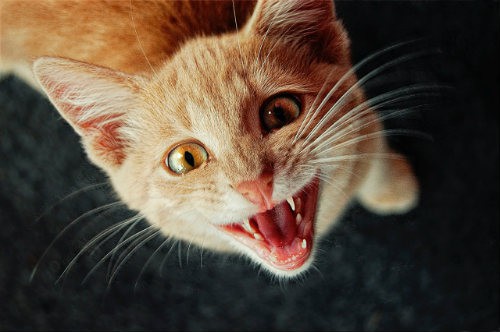
Stress can occasionally cause diarrhea in cats, although less prevalent than in dogs or people. Cats more often manifest stress in other systems such as the urinary tract.
Side Effects of Meds
Be aware that many medications, especially antibiotics and anti-inflammatory drugs, can cause digestive inflammatory issues and diarrhea.
Metabolic
Diarrhea can be a sign of a serious metabolic problem, especially if you have an older cat. A hyperactive thyroid is a common disorder that affects cats, and the metabolic changes can manifest as diarrhea.
Ketoacidosis in diabetic cats can cause systemic failure and diarrhea.
Cats strain with both diarrhea and constipation. Constipated cats will sometimes pass soft and bloody stools. Obstipation (severe constipation) in cats is a dangerous situation that requires immediate attention.
Cancer can contribute to diarrhea by affecting metabolic pathways or causing an obstruction.
How Do You Treat Diarrhea in Cats?
Feeding
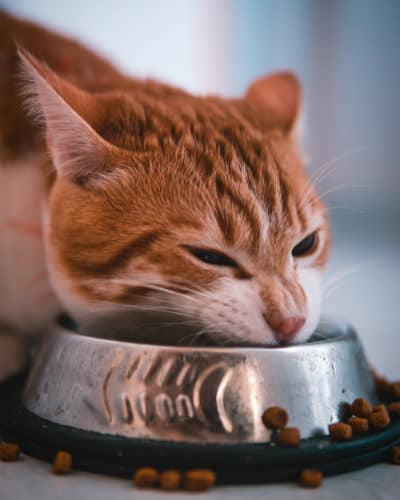
If your cat is also vomiting, by all means, fast her for 24 to 48 hours. However, if she is suffering only from diarrhea, feed to nourish the intestinal tract and help it repair itself quickly.
[amazon bestseller=”cat wet food grain free”]
The best route is to feed at least three or four tiny meals a day of a bland diet. For cats, this means home-cooked chicken or similar protein or meat-based baby food. Ensure the baby food has no onion products in it.
Some people advocate feeding rice or potatoes. Not only is your cat likely to turn his nose up, but felines are obligate carnivores. Your cat is not likely to obtain much useable nutrition from carbohydrates.
Others extoll the virtues of yogurt and cottage cheese. Again, be cautious in case your cat is lactose intolerant, potentially making any diarrhea worse.
It is fine to monitor mild diarrhea for one to three days. However, if your cat’s stools worsen, you notice blood in them, they are black and tarry, or they do not improve within a couple of days, you need to seek help from a health professional.
Over-The-Counter Medications
Pepto Bismol and Kao-pectate are counterindicated in cats because of bismuth subsalicylate, an aspirin derivative in their lists of ingredients. Aspirin and other salicylates are highly toxic to cats. Under no circumstances should you give them to your cat without your veterinarian’s advice (he or she may be able to calculate a safe dosage).
As far as other potential home remedies go, it is best to contact your veterinarian before administering anything. Cats are particularly vulnerable to toxicities and dosage challenges because of the unique traits of their liver metabolism.
When Should You Seek Medical Attention?
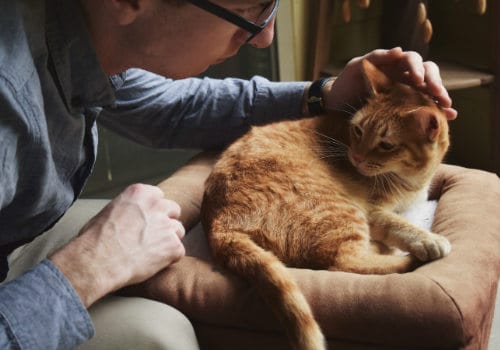
As mentioned earlier, do not allow diarrhea to go untreated for more than a few days. Even in intermittent cases, contact your Veterinarian if your normal treatment is not bringing about the expected results.
The other signal of an urgent problem is if your cat seems to feel unwell. If diarrhea is accompanied by lethargy or dullness, lack of appetite, vomiting, and other signs of general illness, contact your veterinarian immediately.
Diagnosis
Diarrhea is a non-specific symptom with a seemingly endless choice of potential causes. Most of the time if diet and time do not resolve it, a veterinarian will have to delve into the specific cause.
*Fecal exam – examination under a microscope will detect the presence of worms and coccidia
*Physical exam – palpation may reveal severe constipation and whether your cat is dehydrated.
*Bloodwork – can determine if your cat is dehydrated and also helps diagnose metabolic causes of diarrhea such as hyperthyroidism. There are also tests for some infectious causes.
*Therapeutic diagnosis – occasionally with diarrhea, the treatment can prove the diagnosis. Your veterinarian treats your cat presumptively for a temporary case of colitis, and your pet gets better.
*Radiographs – not always very helpful for diarrhea, but can reveal constipation or obstruction from a foreign body or tumor.
*Ultrasound – may reveal issues with specific organs like the pancreas and liver.
*Allergy test – your veterinarian can perform a series of tests to determine if your cat has specific food allergies. Otherwise, you both may decide to treat for food intolerance instead.
Treatment
Medications aim to treat whatever is discovered to cause your cat’s digestive upset.
*Metronidazole (Flagyl) – treats Giardia and is also active against bacteria of specific classes. It is particularly effective against bloody diarrhea with a lot of mucus, a classic sign of non-specific colitis.
*Sulfadimethoxine (Albon) – used commonly to treat coccidia infections. Sometimes treatment must be prolonged.
*Centrine (injectable) – your veterinarian may administer this to relieve intestinal spasms.
Probiotics
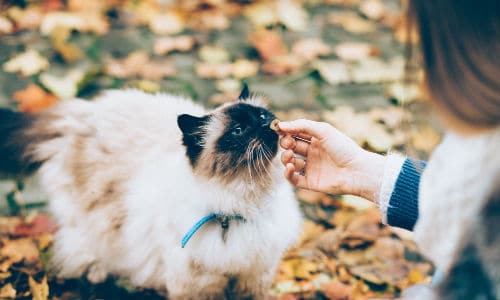
Probiotics and the prebiotics they feed on are vital for effective gut motility and function in cats. Your veterinarian will likely prescribe a compound specifically formulated for cats to help with diarrhea. Note that yogurt will not supply appropriate intestinal cultures for your cat.
[amazon bestseller=”cat probiotics for diarrhea”]
Eliminating Medications
Do not discontinue medications your cat is taking without consulting your veterinarian. In the same vein, inform your cat’s doctor of all supplements, pharmaceuticals, and foods your pet is consuming.
That being said, your vet will likely discontinue medications at least temporarily and perhaps seek alternatives. Probiotics can help greatly in the face of certain antibiotics.
Metabolic Disorders
If your cat has a thyroid problem or other endocrine or metabolic disorder, your veterinarian will address them. Usually, re-establishing normalcy in other systems will restore happiness to the gut. Some endocrine disorders require simple supplementation, such as a thyroid inhibiting drug or insulin.
In some cases, your cat may need intravenous fluids and drugs to correct imbalances before treating diseases like diabetes or fatty liver.
Allergy and Limited-Ingredient Cat Food
Allergy diets are not alway prescription anymore, but your veterinarian can instruct you on appropriate cat food if your pet suffers from hypersensitivity.
Likewise, your veterinarian can guide you on which ingredients to limit. Your cat may not tolerate beef, but you may need to limit duck as well, for example. You can also consult with your professional about whether to try a low-fiber or a no-grain diet, which helps many cats with persistent diarrhea.
Conclusion
Diarrhea, while not uncommon in cats, can be challenging to treat because it is such a nebulous symptom. Anything from a sensitive stomach or dietary indiscretion to severe disease can cause diarrhea in cats. Adding to the dilemma, the biology of cats makes it tricky to treat them without professional intervention.
Once you figure out the most likely cause of your pet’s diarrhea, treatment becomes much more targeted.
[amazon bestseller=”probiotic cats powder diarrhea”]
Fortunately for the vast majority of cats, diarrhea is an ailment that quickly resolves on its own or is easily treated with minimal changes or medications.
"In ancient times cats were worshipped as gods; they have not forgotten this."
-- Terry Pratchett

